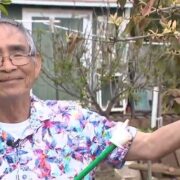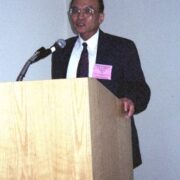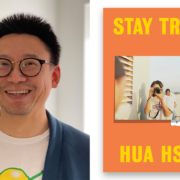Leaving Home Was Hard; Returning Was Even Harder
By Mu-Sheng Wu
I hung up the phone and was very excited. The opportunity had come finally, only a little too early. Two years later would have been ideal. In eleven months, I could take early retirement and in two years my youngest child would graduate from college relieving my economic burden considerably. None were important when compared with going back to that old home with a six Tatami bedroom. I was longing to return.
I had just finished talking to my company’s New York headquarter. They wanted me to consider an assignment to lead the construction and operations of a new plant in Taiwan. Since it was still in the planning phase, the information was to be kept secret. Before I called my wife, I wanted to have some time to digest the news. I closed my office door and asked the secretary not take any visitors or telephones for a while.
Thirty minutes later, I called my wife. She was as happy and excited as I was. We had been in the States for more than a quarter of century. Our passion to return home had grown stronger every year. When we left Taiwan, our plan had been only to stay in the US a short time. I also had kept telling myself that I should go home as soon as I could. However, I continued to stay, year after year. My wife said we should accept the offer and go home. She wanted to bring her parents to our future home to stay with us, which was her heart’s desire. Of course, I also had plans to bring my own mother to stay with us. She had suffered so much for our family. In the past, we were so far from home that we couldn’t easily show our love to our parents.
We had just moved from Rhode Island to Alabama. In reality, our move was not complete. There were so many things we still had to do, but the new opportunity changed our plans. We delayed the purchase of furniture, drapes and blinds. We also stopped work on decorations and landscaping. My company was headquartered in Switzerland. The new plant in Taiwan was under the management of the company’s International Division which operated independently from the US Division, my new assignment would be a job change rather than a transfer. Therefore, I would have to resign my position with the US Division first which would significantly affect my retirement and pension. Besides, there were other considerations too.
I had few accomplishments, but I had established a job position that enabled my family to live comfortably. I had also left my mark on almost every corner of the States, although my footprints were not terribly important, they were my life. I could not emotionally forget my past twenty-five years. I could also not change reality to memory in an instant. To me, it was emotional to leave this familiar country. Besides, we would also be leaving our three children and so many good friends who had shared many difficult times and events.
But regardless, we had happily decided to go home. I would contribute whatever I could with my expertise in pollution control technologies to my homeland. I was so happy for having the opportunity.
Three months after I emotionally prepared myself to take the new job, the real preparation started. My first step was to visit the marketing department in Hong Kong who were responsible for the Southeast Asia region to coordinate production with them. I would then go to Taiwan to tour the production site and finally travel to Switzerland to review the entire project.
I submitted my visa application to KMT’s Atlanta Office. Two weeks went by and I heard nothing. I called them and learned the Investigation Bureau of the Ministry of Justice in Taiwan had refused my application. One of the officials in charge of the visa application in the Atlanta Office told me that the Investigation Bureau was concerned with the safety of Taiwanese society. He advised me to guarantee in writing that I would not make any trouble while in Taiwan, and he would be willing to talk to people in Taiwan once more. According to his instructions I submitted a letter stating I would be visiting Taiwan strictly for business and not politics. In the letter I also mentioned that I had not contacted any institution other than my company and I would not participate in any political activities in Taiwan. Again, Taiwan refused to grant me a visa. In the entire process of the application, all the officials were polite, although Taiwan had rejected my application.
In retrospect, our home had been a temporary shelter for new Taiwanese students who were either new to this country or working
summer jobs. We also helped them find houses, go through registration, get engagement and married, and look for jobs. In order to reduce their homesickness and provide assistance support network, we helped establish the Taiwanese Association. I had served twice as the local President and once as national President. I was also in charge of the International Environmental Protection Association once with the goal to improve the environment in Taiwan.
I was not interested in politics although I was aware of its importance. While you could choose to learn about chemistry or physics, you could not avoid politics regardless of your interest. Paying attention to politics was not only your right but also your obligation.
During the last ten years, we lived in a small town in a rural area. We had little opportunity to participate in Taiwanese activities, but our love for our homeland never diminished but rather gotten stronger. My company’s construction of a new plant in Taiwan provided me with a good opportunity to serve my homeland. We had decided to give up a comfortable life and a good job, leave our children behind, sacrifice my pension, and contribute my technical expertise to Taiwan – the country that had nourished and educated me. We would also try to do our best on the long neglected filial piety. But, KMT refused our request.
Soon after the KMT Atlanta Office returned our application, I saw a list of people’s names on KMT Blacklist in a newspaper. I did not find my name after an exhaustive search.
The news of the KMT’s rejection of my visa application soon spread in the company. One of our officials from the Headquarter said resentfully that it was ridiculous; one of my colleagues said, “I thought KMT has changed, but it is still the old KMT.” In addition, many colleagues also came out with supportive words.
Source from Mu-Sheng Wu
Posted in 06/2020





